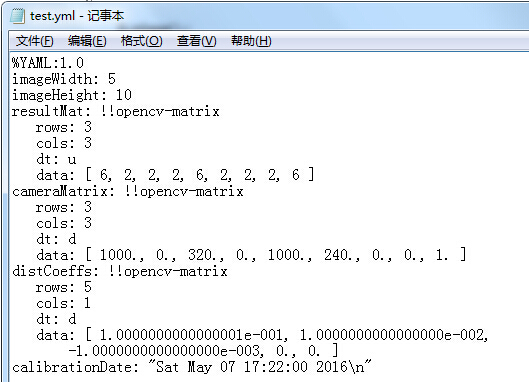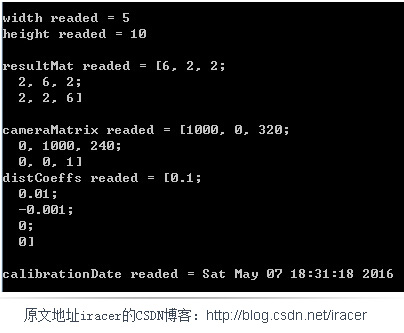OpenCV —FileStorage类的数据读写操作与示例

OpenCV的许多应用都需要使用数据的存储于读取,例如经过3D校准后的相机,需要存储校准结果矩阵,以方便下次调用该数据;基于机器学习的应用,同样需要将学习得到的参数保存等。OpenCV通过XML/YAML格式实现数据持久化。本文简要梳理了使用FileStorage类进行基本数据持久化操作,给出了示例代码。
主要内容包括:
FileStorage类
- 构造函数
- operator <<
- FileStorage::open
- FileStorage::isOpened
- FileStorage::release
- FileStorage::getFirstTopLevelNode
- FileStorage::root
- FileStorage::operator[]
示例代码
- 创建写入器、创建读取器
- 写入数值、写入矩阵、写入自定义数据结构、写入当前时间
- 读取数值、读取矩阵、读取自定义数据结构、读取当前时间
- 关闭写入器、关闭读取器
FileStorage类
FileStorage类将各种OpenCV数据结构的数据存储为XML 或 YAML格式。同时,也可以将其他类型的数值数据存储为这两种格式。
构造函数
FileStorage类的构造函数为:
- cv::FileStorage(const string& source, int flags, const string& encoding=string());
参数:
source –存储或读取数据的文件名(字符串),其扩展名(.xml 或 .yml/.yaml)决定文件格式。
flags – 操作模式,包括:
- FileStorage::READ 打开文件进行读操作
- FileStorage::WRITE 打开文件进行写操作
- FileStorage::APPEND打开文件进行附加操作
- FileStorage::MEMORY 从source读数据,或向内部缓存写入数据(由FileStorage::release返回)
encoding – 文件编码方式。目前不支持UTF-16 XML 编码,应使用 8-bit 编码。
写数据operator <<
向filestorage中写入数据
- template<typename_Tp> FileStorage& operator<<(FileStorage& fs, const _Tp& value)
- template<typename_Tp> FileStorage& operator<<(FileStorage& fs, const vector<_Tp>& vec)
fs – 已经打开的用于写数据的file storage对象
value – 待写入fs 的数据.
vec – 待写入fs 的向量值
以下代码分别演示写入数值、矩阵、多个变量、当前时间和关闭文件:
- // 1.create our writter
- cv::FileStorage fs("test.yml", FileStorage::WRITE);
- // 2.Save an int
- int imageWidth= 5;
- int imageHeight= 10;
- fs << "imageWidth" << imageWidth;
- fs << "imageHeight" << imageHeight;
- // 3.Write a Mat
- cv::Mat m1= Mat::eye(3,3, CV_8U);
- cv::Mat m2= Mat::ones(3,3, CV_8U);
- cv::Mat resultMat= (m1+1).mul(m1+2);
- fs << "resultMat" << resultMat;
- // 4.Write multi-variables
- cv::Mat cameraMatrix = (Mat_<double>(3,3) << 1000, 0, 320, 0, 1000, 240, 0, 0, 1);
- cv::Mat distCoeffs = (Mat_<double>(5,1) << 0.1, 0.01, -0.001, 0, 0);
- fs << "cameraMatrix" << cameraMatrix << "distCoeffs" << distCoeffs;
- // 5.Save local time
- time_t rawtime; time(&rawtime); //#include <time.h>
- fs << "calibrationDate" << asctime(localtime(&rawtime));
- // 6.close the file opened
- fs.release();
生成的文件test.yml

FileStorage::open
打开一个文件
- boolFileStorage::open(const string& filename, int flags, const string&encoding=string())
参数:
filename – 待打开的文件名,其扩展名(.xml 或 .yml/.yaml) 决定文件格式(XML 或 YAML)
flags – 操作模式。见构造函数
encoding – 文件编码方式。
- // open a file
- cv::FileStorage fs;
- fs.open("test.yml",FileStorage::WRITE);
- // ... some process here
- fs.release();
FileStorage::isOpened
检查文件是否已经打开,调用:
- boolFileStorage::isOpened()
返回:
ture – 如果对象关联了当前文件;
false – 其他情况。
尝试打开文件后调用此方法是个比较好的做法。
- // Checks whether the file is opened
- cv::FileStorage fs;
- fs.open("test.yml",FileStorage::WRITE);
- bool flag = fs.isOpened();
- cout<<"flag = "<<flag<<endl<<endl;
- // if failed to open a file
- if(!fs.isOpened()){
- cout<<"failed to open file test.yml "<<endl<<endl;
- return 1;
- }
运行结果:

FileStorage::release
存储或读取操作完成后,需要关闭文件并释放缓存,调用
- void FileStorage::release()
- cv::FileStorage fs("test.yml", fs::WRITE);
- //... some processing here
- fs.release();
FileStorage::getFirstTopLevelNode
返回映射(mapping)顶层的第一个元素:
- FileStorage::getFirstTopLevelNode()
- // open a file for reading
- fs.open("test.yml", FileStorage::READ);
- // get the first top level node
- int firstNode = fs.getFirstTopLevelNode();
- cout<<"the First Top Level Node = "<<firstNode<<endl<<endl;
运行结果

FileStorage::root
返回顶层映射(mapping)
- FileNode FileStorage::root(int streamidx=0)
参数:
streamidx – 从0开始的字符串索引。大部分情况文件中只有一个串,但YAML支持多个串,因此可以有多个。
Returns: 顶层映射
读数据:FileStorage::operator[]
返回指定的顶层映射元素
- FileNode FileStorage::operator[](const string& nodename) const
- FileNode FileStorage::operator[](const char* nodename) const
参数:
nodename – 文件节点名(见下文FileNode类)
返回:名称为nodename的节点数据
- // read data using operator []
- cv::FileStorage fs("test.yml", FileStorage::READ);
- int width;
- int height;
- fs["imageWidth"]>>width;
- fs["imageHeight"]>>height;
- cout<<"width readed = "<<width<<endl;
- cout<<"height readed = "<<height<<endl<<endl;
- // read Mat
- cv::Mat resultMatRead;
- fs["resultMat"]>>resultMatRead;
- cout<<"resultMat readed = "<<resultMatRead<<endl<<endl;
- cv::Mat cameraMatrixRead,distCoeffsRead;
- fs["cameraMatrix"]>>cameraMatrixRead;
- fs["distCoeffs"]>>distCoeffsRead;
- cout<<"cameraMatrix readed = "<<cameraMatrixRead<<endl;
- cout<<"distCoeffs readed = "<<distCoeffsRead<<endl<<endl;
- // read string
- string timeRead;
- fs["calibrationDate"]>>timeRead;
- cout<<"calibrationDate readed = "<<timeRead<<endl<<endl;
- fs.release();
运行结果
转载请注明出处(本文更新链接):http://blog.csdn.net/iracer/article/details/51339377
OpenCV —FileStorage类的数据读写操作与示例

OpenCV的许多应用都需要使用数据的存储于读取,例如经过3D校准后的相机,需要存储校准结果矩阵,以方便下次调用该数据;基于机器学习的应用,同样需要将学习得到的参数保存等。OpenCV通过XML/YAML格式实现数据持久化。本文简要梳理了使用FileStorage类进行基本数据持久化操作,给出了示例代码。
主要内容包括:
FileStorage类
- 构造函数
- operator <<
- FileStorage::open
- FileStorage::isOpened
- FileStorage::release
- FileStorage::getFirstTopLevelNode
- FileStorage::root
- FileStorage::operator[]
示例代码
- 创建写入器、创建读取器
- 写入数值、写入矩阵、写入自定义数据结构、写入当前时间
- 读取数值、读取矩阵、读取自定义数据结构、读取当前时间
- 关闭写入器、关闭读取器
FileStorage类
FileStorage类将各种OpenCV数据结构的数据存储为XML 或 YAML格式。同时,也可以将其他类型的数值数据存储为这两种格式。
构造函数
FileStorage类的构造函数为:
- cv::FileStorage(const string& source, int flags, const string& encoding=string());
参数:
source –存储或读取数据的文件名(字符串),其扩展名(.xml 或 .yml/.yaml)决定文件格式。
flags – 操作模式,包括:
- FileStorage::READ 打开文件进行读操作
- FileStorage::WRITE 打开文件进行写操作
- FileStorage::APPEND打开文件进行附加操作
- FileStorage::MEMORY 从source读数据,或向内部缓存写入数据(由FileStorage::release返回)
encoding – 文件编码方式。目前不支持UTF-16 XML 编码,应使用 8-bit 编码。
写数据operator <<
向filestorage中写入数据
- template<typename_Tp> FileStorage& operator<<(FileStorage& fs, const _Tp& value)
- template<typename_Tp> FileStorage& operator<<(FileStorage& fs, const vector<_Tp>& vec)
fs – 已经打开的用于写数据的file storage对象
value – 待写入fs 的数据.
vec – 待写入fs 的向量值
以下代码分别演示写入数值、矩阵、多个变量、当前时间和关闭文件:
- // 1.create our writter
- cv::FileStorage fs("test.yml", FileStorage::WRITE);
- // 2.Save an int
- int imageWidth= 5;
- int imageHeight= 10;
- fs << "imageWidth" << imageWidth;
- fs << "imageHeight" << imageHeight;
- // 3.Write a Mat
- cv::Mat m1= Mat::eye(3,3, CV_8U);
- cv::Mat m2= Mat::ones(3,3, CV_8U);
- cv::Mat resultMat= (m1+1).mul(m1+2);
- fs << "resultMat" << resultMat;
- // 4.Write multi-variables
- cv::Mat cameraMatrix = (Mat_<double>(3,3) << 1000, 0, 320, 0, 1000, 240, 0, 0, 1);
- cv::Mat distCoeffs = (Mat_<double>(5,1) << 0.1, 0.01, -0.001, 0, 0);
- fs << "cameraMatrix" << cameraMatrix << "distCoeffs" << distCoeffs;
- // 5.Save local time
- time_t rawtime; time(&rawtime); //#include <time.h>
- fs << "calibrationDate" << asctime(localtime(&rawtime));
- // 6.close the file opened
- fs.release();
生成的文件test.yml

FileStorage::open
打开一个文件
- boolFileStorage::open(const string& filename, int flags, const string&encoding=string())
参数:
filename – 待打开的文件名,其扩展名(.xml 或 .yml/.yaml) 决定文件格式(XML 或 YAML)
flags – 操作模式。见构造函数
encoding – 文件编码方式。
- // open a file
- cv::FileStorage fs;
- fs.open("test.yml",FileStorage::WRITE);
- // ... some process here
- fs.release();
FileStorage::isOpened
检查文件是否已经打开,调用:
- boolFileStorage::isOpened()
返回:
ture – 如果对象关联了当前文件;
false – 其他情况。
尝试打开文件后调用此方法是个比较好的做法。
- // Checks whether the file is opened
- cv::FileStorage fs;
- fs.open("test.yml",FileStorage::WRITE);
- bool flag = fs.isOpened();
- cout<<"flag = "<<flag<<endl<<endl;
- // if failed to open a file
- if(!fs.isOpened()){
- cout<<"failed to open file test.yml "<<endl<<endl;
- return 1;
- }
运行结果:

FileStorage::release
存储或读取操作完成后,需要关闭文件并释放缓存,调用
- void FileStorage::release()
- cv::FileStorage fs("test.yml", fs::WRITE);
- //... some processing here
- fs.release();
FileStorage::getFirstTopLevelNode
返回映射(mapping)顶层的第一个元素:
- FileStorage::getFirstTopLevelNode()
- // open a file for reading
- fs.open("test.yml", FileStorage::READ);
- // get the first top level node
- int firstNode = fs.getFirstTopLevelNode();
- cout<<"the First Top Level Node = "<<firstNode<<endl<<endl;
运行结果

FileStorage::root
返回顶层映射(mapping)
- FileNode FileStorage::root(int streamidx=0)
参数:
streamidx – 从0开始的字符串索引。大部分情况文件中只有一个串,但YAML支持多个串,因此可以有多个。
Returns: 顶层映射
读数据:FileStorage::operator[]
返回指定的顶层映射元素
- FileNode FileStorage::operator[](const string& nodename) const
- FileNode FileStorage::operator[](const char* nodename) const
参数:
nodename – 文件节点名(见下文FileNode类)
返回:名称为nodename的节点数据
- // read data using operator []
- cv::FileStorage fs("test.yml", FileStorage::READ);
- int width;
- int height;
- fs["imageWidth"]>>width;
- fs["imageHeight"]>>height;
- cout<<"width readed = "<<width<<endl;
- cout<<"height readed = "<<height<<endl<<endl;
- // read Mat
- cv::Mat resultMatRead;
- fs["resultMat"]>>resultMatRead;
- cout<<"resultMat readed = "<<resultMatRead<<endl<<endl;
- cv::Mat cameraMatrixRead,distCoeffsRead;
- fs["cameraMatrix"]>>cameraMatrixRead;
- fs["distCoeffs"]>>distCoeffsRead;
- cout<<"cameraMatrix readed = "<<cameraMatrixRead<<endl;
- cout<<"distCoeffs readed = "<<distCoeffsRead<<endl<<endl;
- // read string
- string timeRead;
- fs["calibrationDate"]>>timeRead;
- cout<<"calibrationDate readed = "<<timeRead<<endl<<endl;
- fs.release();
运行结果
转载请注明出处(本文更新链接):http://blog.csdn.net/iracer/article/details/51339377
